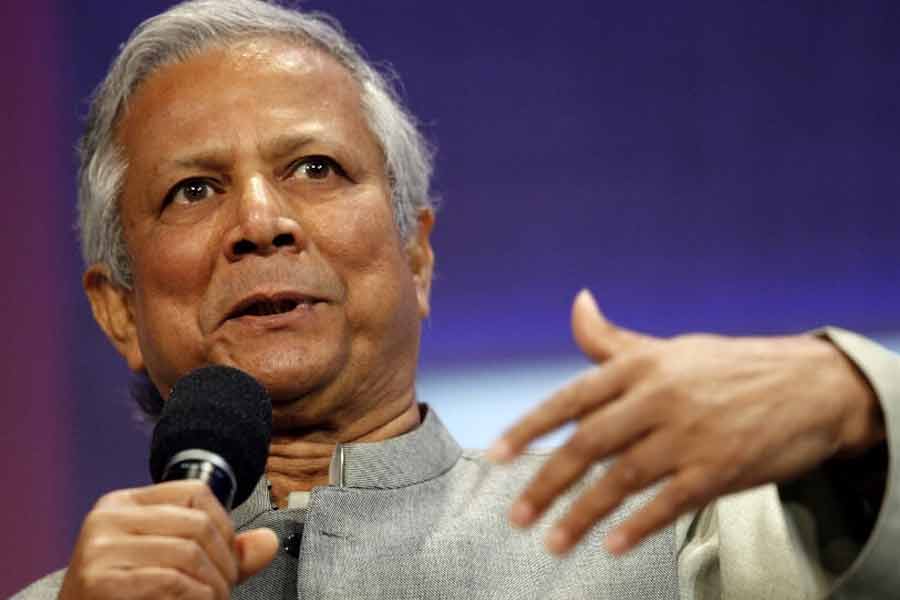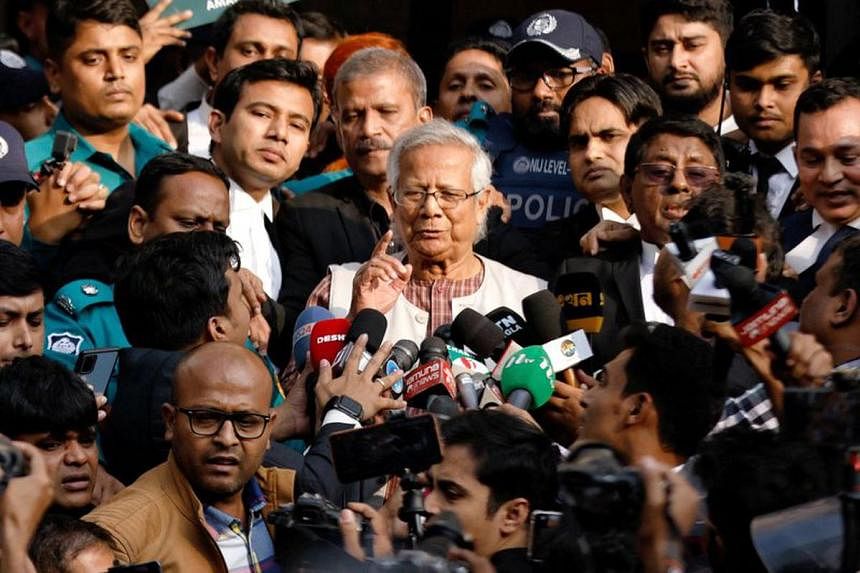The 83-year-old economist was on Monday sentenced to six months in jail by a court for violating the labour laws, which was termed as 'politically motivated' by his supporters ahead of the January 7 general elections
PTI Dhaka Published 02.01.2024

Dr Muhammad Yunus
Amnesty International has condemned the conviction of Bangladesh's Nobel laureate economist Dr Muhammad Yunus by a Dhaka labour court, calling it "emblematic of the beleaguered state of human rights" in the country where critics are "bulldozed" into submission.
The 83-year-old economist was on Monday sentenced to six months in jail by a court for violating the labour laws, which was termed as "politically motivated" by his supporters ahead of the January 7 general elections. He sought bail after the ruling, which he was granted immediately for a month in exchange for a Taka 5,000 (USD 45) bond.
Yunus and three of his colleagues in Grameen Telecom-- one of the firms he founded-- were accused of violating labour laws when they failed to create a workers' welfare fund in the company.
In a post on the social media platform X, Amnesty International's South Asia regional office said, "The conviction of Yunus is emblematic of the beleaguered state of human rights in Bangladesh, where the authorities have eroded freedoms and bulldozed critics into submission." The human rights organisation said that the unusual speed at which the trial against Yunus was completed starkly contrasts the "snail-paced progress" in other labour rights-related court cases in the country.
"The abuse of labour laws and misuse of the justice system to settle political vendettas is a violation of international human rights law," it said.
Yunus won the Nobel Peace Prize in 2006 for his anti-poverty campaign, earning Bangladesh the reputation of being the home of microcredit through his Grameen Bank, which he founded in 1983.
Dhaka's Third Labour Court on Monday ordered Yunus to serve six months of simple or non-rigorous imprisonment for violating the law as the Grameen Telecom chairman, along with three other executives of the social business company.
A Taka 25,000 fine (USD 227.82) was also slapped on each of them before they were granted bail upon submitting separate petitions.
Describing the judgment as "politically motivated", his supporters said the charges were filed to harass him.
The economist was on a protracted row with the incumbent government due to obscure reasons. The government led by Prime Minister Sheikh Hasina launched a series of investigations against him after coming to power in 2008.
Many people believe that Hasina became enraged when Yunus announced he would form a political party in 2007 when the country was run by a military-backed government and she was in prison.
However, Yunus did not follow through on the plan but criticised politicians in the country, alleging they were only interested in making money.
The Nobel laureate is also facing a series of charges relating to labour law and misappropriation of money.
Bangladesh's tangles with Yunus, Nobel winner and microloan founder


Bangladeshi Nobel peace laureate Professor Muhammad Yunus gestures in front of the court after being sentenced to six months of imprisonment and fined BDT 5,000 in a labour law violation case, in Dhaka, Bangladesh, January 1, 2024.
REUTERS/Mohammad Ponir Hossain/File Photo
DHAKA - A Bangladesh court has sentenced the country's only Nobel laureate, Mohammad Yunus, to six months in jail over labour law violations, a crime he says he did not commit, days ahead of a Jan. 7 general election boycotted by the main opposition party.
Below is a summary of key facts in Yunus' tangles with the law in Bangladesh, with Prime Minister Sheikh Hasina often criticising the 83-year-old, who won the peace prize in 2006 for his work in making microloans accessible to the impoverished:
* Yunus started a microfinance movement in late 1976, offering loans below $100 apiece to women in Bangladesh's port city of Chittagong to help them escape poverty and vulnerability to loan sharks.
* He and Grameen Bank, the rural-focused microfinance organization he founded, became Bangladesh's first Nobel winner for providing small loans to the poor, a practice that spread to more than 100 nations from the United States to Uganda.
* Yunus, a professor of economics who had been Grameen Bank's managing director since 2000, was removed as head of the bank in 2011 by Prime Minister Sheikh Hasina's government on the grounds he had stayed on past the legal retirement age of 60.
* His popular image and fame came under fresh focus in 2007 as he attempted to form a political party, when the country was under a de-facto military government with a civilian outfit.
* Despite his microfinance's global success, there have been concerns such lenders charge excessive interest rates.
* A Norwegian documentary alleged in 2010 that Grameen bank was dodging taxes. The documentary sparked criticism in Bangladesh and abroad of Yunus, whose bank has provided about $10 billion in small loans to people, most of them women, to fund businesses and help them escape poverty.
* Lauded abroad by politicians and financiers, Yunus has been under attack from Hasina's government since the documentary alleged that Grameen Bank was dodging taxes. Hasina, in 2011, famously called Yunus a "blood-sucker of the poor" and sharply criticised Grameen Bank's microlending practices.
* Yunus has denied financial irregularities and his supporters say he is being discredited by the government because of a feud with Hasina dating back to 2007, when he tried to setup a rival political party.
* Yunus faces more than 100 cases in court, including two criminal charges over labour law violations and alleged corruption.
* In September, Amnesty International called on the Bangladesh government to "immediately end their harassment and intimidation of Yunus". The rights group called Monday's court verdict a blatant abuse of labour laws and political retaliation for his work.
* 190 global leaders, including former United States President Barack Obama and over 100 Nobel laureates, wrote an open letter in August to Hasina urging her to stop "continuous judicial harassment" of Yunus.
* Reacting to Yunus' conviction on Monday, Bangladesh's Road Transport and Bridges Minister Obaidul Quader said no one was above the law.
DHAKA - A Bangladesh court has sentenced the country's only Nobel laureate, Mohammad Yunus, to six months in jail over labour law violations, a crime he says he did not commit, days ahead of a Jan. 7 general election boycotted by the main opposition party.
Below is a summary of key facts in Yunus' tangles with the law in Bangladesh, with Prime Minister Sheikh Hasina often criticising the 83-year-old, who won the peace prize in 2006 for his work in making microloans accessible to the impoverished:
* Yunus started a microfinance movement in late 1976, offering loans below $100 apiece to women in Bangladesh's port city of Chittagong to help them escape poverty and vulnerability to loan sharks.
* He and Grameen Bank, the rural-focused microfinance organization he founded, became Bangladesh's first Nobel winner for providing small loans to the poor, a practice that spread to more than 100 nations from the United States to Uganda.
* Yunus, a professor of economics who had been Grameen Bank's managing director since 2000, was removed as head of the bank in 2011 by Prime Minister Sheikh Hasina's government on the grounds he had stayed on past the legal retirement age of 60.
* His popular image and fame came under fresh focus in 2007 as he attempted to form a political party, when the country was under a de-facto military government with a civilian outfit.
* Despite his microfinance's global success, there have been concerns such lenders charge excessive interest rates.
* A Norwegian documentary alleged in 2010 that Grameen bank was dodging taxes. The documentary sparked criticism in Bangladesh and abroad of Yunus, whose bank has provided about $10 billion in small loans to people, most of them women, to fund businesses and help them escape poverty.
* Lauded abroad by politicians and financiers, Yunus has been under attack from Hasina's government since the documentary alleged that Grameen Bank was dodging taxes. Hasina, in 2011, famously called Yunus a "blood-sucker of the poor" and sharply criticised Grameen Bank's microlending practices.
* Yunus has denied financial irregularities and his supporters say he is being discredited by the government because of a feud with Hasina dating back to 2007, when he tried to setup a rival political party.
* Yunus faces more than 100 cases in court, including two criminal charges over labour law violations and alleged corruption.
* In September, Amnesty International called on the Bangladesh government to "immediately end their harassment and intimidation of Yunus". The rights group called Monday's court verdict a blatant abuse of labour laws and political retaliation for his work.
* 190 global leaders, including former United States President Barack Obama and over 100 Nobel laureates, wrote an open letter in August to Hasina urging her to stop "continuous judicial harassment" of Yunus.
* Reacting to Yunus' conviction on Monday, Bangladesh's Road Transport and Bridges Minister Obaidul Quader said no one was above the law.
REUTERS
No comments:
Post a Comment